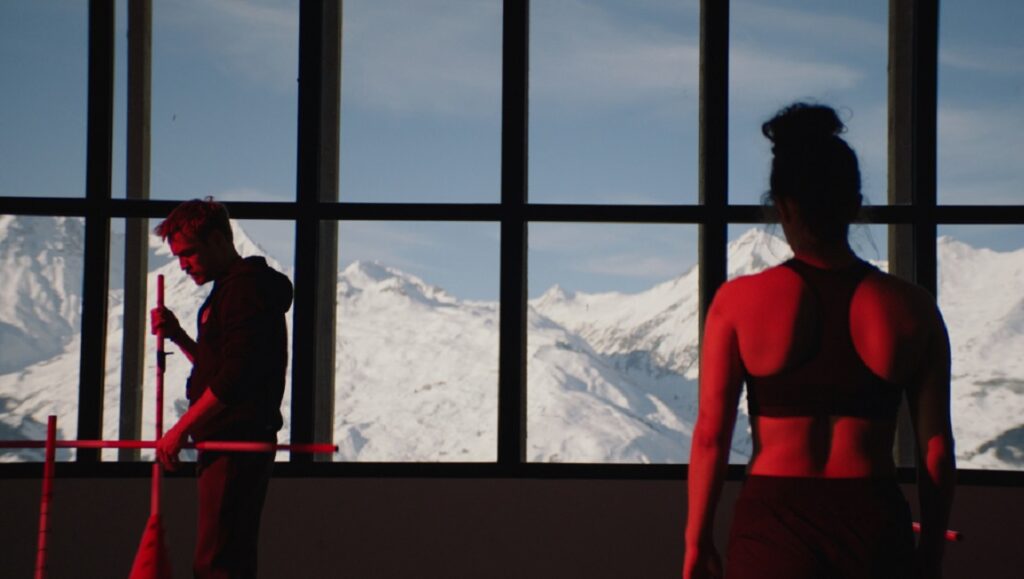Slalom is a raw and unpretentious study of trauma and the ways in which young women can wrest back control of their own course.
The slalom belongs to a group of Olympic events whose competition is built around the descent. Unlike a sport like the long jump, which demands athletes defy gravity, this skiing race embraces gravity, governed by its power in propelling the athlete downhill. Even its terminology acknowledges this idea describing the straightest path down as the fall-line. Stopping mid-fall would take more effort than being pulled along by momentum, and so the competition, in a sense, is about persevering over this drop. This last bit is the brooding backbone of Charlène Favier’s Slalom, a story about a young skier, Lyz (Noée Abita), who struggles to navigate the demands of sport and adolescence, while enduring sexual abuse from her predatory coach. Though the metaphor of the descent lingers in the background, Favier’s film is more immediate — all crunching snow and heavy breaths — and this physicality combined with her impressionistic flair comes together in a compact yet robust exploration of abuse and the adolescent psyche.
Favier’s filming style is subjective, the camera clinging to characters in tight, shallow focus close-ups, capturing discomfiting moments in half-shadow, shifting to woozy night scenes bathed in color, and then to sobered clarity of day under the hyper-white albedo of the snow. It’s surprising how exhilarating the slalom sequences are given the film’s intense psychological focus. Bolstered by a feverish score, the camera darts after Lyz as she takes the slope, staying tightly to her side as the effusive electronic heartbeat mingles with muffling wind and shallow breaths. It’s in the aftermath of these rapturous heights of her first victory that her coach, Fred (Jérémie Renier), commits his first sexual assault. The scene is wrought in disturbed stillness, all shadow, silence past the sound of his groans, an antonym to the electric energy of the slalom that preceded it. Lyz sits in the driver’s seat of his car — the illusion of control — as Fred forces her hand to his crotch, the camera remaining trained on her eyes which are locked in fear and indecision.
Renier, a staple of the Dardennes’ filmography, balances Fred’s menacing intensity and predatory delicacy, but Abita dominates the film as Lyz. This role comes on the heels of a stellar debut in Léa Mysius’ Ava, where she played a young girl facing down an impending loss of vision with raucous rebellion. Here, Abita once again communicates so much with her expressive eyes, which seem perpetually rapt in a flurry of thoughts. When Lyz recedes into silence, Abita quietly reveals the inner machinations — attempts to control and compartmentalize explosive emotions under a mask of affected maturity. Moments when this mask slips, such as the harrowing sequence in the car, reveal a barely controlled terror, a mirror to the complete emotional surrender in her mother’s embrace towards the end of the film. It’s a startling performance from the young actress, recalling the terse and heart-rending maturity brought by Thomasin Mckenzie in Debra Granik’s Leave No Trace.
Slalom builds on some of the ideas of the director’s 2018 short Odol Gorri (Red Blood), also starring Abita, there as an orphaned teen who escapes from juvie into an inappropriate sexual encounter with an older man. In both, the young girls rationalize their relationships with these older men as surrogate father figures. While the abuse is central in Slalom, Favier uses it as a springboard to a broader study of turbulent teenage years and self-discovery. Past the dynamic with Fred, we watch the tensions between her and her aloof parents, the boys in her skiing group, and with her friend Justine (Maïra Schmitt) who makes a sexual advance of her own. Lyz searches for but fails to find solid ground in each of these situations, leading her to depend on her training, competition, and, by necessity, her relationship with Fred in a desperate grasp at stability. Her journey is captured in a raw and unpretentious way, never so much as hinting at the cloying sentimentality that sometimes accompanies such difficult subject matter. Favier’s approach is personal, not didactic, and the result is an intimate and unnerving coming of age film; one that reveals the emotional turmoil of adolescence, and the resilience that defines moments when youth wrest control of their trajectory and defy the momentum plunging them down the fall-line.


Comments are closed.